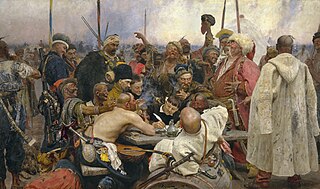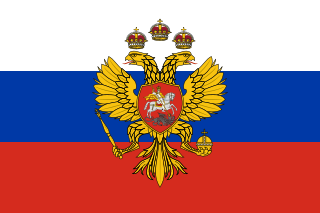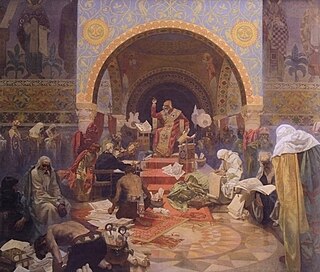Related Research Articles

The Mongol Empire invaded and conquered much of Kievan Rus' in the mid-13th century, sacking numerous cities such as Ryazan, Yaroslavl, Pereyaslavl and Vladimir, including the largest: Kiev and Chernigov. The siege of Kiev in 1240 by the Mongols is generally held to mark the end of the state of Kievan Rus', which had already been undergoing fragmentation. Many other principalities and urban centres in the northwest and southwest escaped complete destruction or suffered little to no damage from the Mongol invasion, including Galicia–Volhynia, Pskov, Smolensk, Polotsk, Vitebsk, and probably Rostov and Uglich.

Ivan IV Vasilyevich, commonly known as Ivan the Terrible, was Grand Prince of Moscow and all Russia from 1533 to 1547, and the first Tsar and Grand Prince of all Russia from 1547 until his death in 1584. Ivan's reign was characterised by Russia's transformation from a medieval state to a fledgling empire, but at an immense cost to its people and long-term economy.

Ivan III Vasilyevich, also known as Ivan the Great, was Grand Prince of Moscow and all Russia from 1462 until his death in 1505. Ivan served as the co-ruler and regent for his blind father Vasily II before he officially ascended the throne.
In Protestant Reformation history, confessionalization is the parallel processes of "confession-building" taking place in Europe between the Peace of Augsburg (1555) and the Thirty Years' War (1618–1648). For most of this time, there was a nominal peace in the Holy Roman Empire between the Protestant and Catholic confessions as both competed to establish their faith more firmly with the population of their respective areas. This confession-building occurred through "social-disciplining," as there was a stricter enforcement by the churches of their particular rules for all aspects of life in both Protestant and Catholic areas. This had the consequence of creating distinctive confessional identities that influenced church dogma, faith formation, liturgy, and the development of universities.

The Russo-Turkish War of 1672–1681, a war between the Tsardom of Russia and Ottoman Empire, caused by Turkish expansionism in the second half of the 17th century. Is the largest and one of the most important series of military campaigns before the Great Turkish War.

The Battle of [the] Vedrosha was fought near the Vedrosha river, close to Dorogobuzh on 14 July 1500, during the Second Muscovite–Lithuanian War (1500–1503).

The Treaty of Hadiach was a treaty signed on 16 September 1658 in Hadiach between representatives of the Polish–Lithuanian Commonwealth and Zaporozhian Cossacks.

The Tsardom of Russia, also known as the Tsardom of Moscow, was the centralized Russian state from the assumption of the title of tsar by Ivan IV in 1547 until the foundation of the Russian Empire by Peter the Great in 1721.

The Russo-Turkish War (1568–1570) or Don-Volga-Astrakhan campaign of 1569 was a war between the Tsardom of Russia and the Ottoman Empire over the Astrakhan Khanate. It was the first of twelve Russo-Turkish wars ending with World War I in 1914–18.
Tsarist autocracy[a], also called Tsarism, was an autocracy, a form of absolute monarchy localised with the Grand Duchy of Moscow and its successor states, the Tsardom of Russia and the Russian Empire.[b] In it, the Tsar possessed in principle authority and wealth, with more power than constitutional monarchs counterbalanced by legislative authority, as well as a more religious authority than Western monarchs. The institution originated during the time of Ivan III (1462−1505) and was abolished after the Russian Revolution of 1917.
George Hugh Nicolas Seton-Watson, CBE, FBA was a British historian and political scientist specialising in Russia.
Ruslan Grigorievich Skrynnikov was a Russian historian who studied the reign of Ivan the Terrible. He later moved on to study the Time of Troubles.

Tsar is a title historically used by Slavic monarchs. The term is derived from the Latin word caesar, which was intended to mean emperor in the European medieval sense of the term—a ruler with the same rank as a Roman emperor, holding it by the approval of another emperor or a supreme ecclesiastical official—but was usually considered by Western Europeans to be equivalent to "king".

The "terem" refers to the separate living quarters occupied by elite women of the Principality of Moscow and Tsardom of Russia. Also, the upper story of a home or castle, often with a pitched roof. More broadly, the term is used by historians to discuss the elite social practice of female seclusion that reached its height in the seventeenth century. Royal or noble women were not only confined to separate quarters, but were also prevented from socialization with men outside their immediate family, and were shielded from the public eye in closed carriages or heavily concealing clothing.
The gathering of the Russian lands or Rus' lands was the process in which new states – usually the Principality of Moscow and the Grand Duchy of Lithuania – acquired former territories of Kievan Rus' from the 14th century onwards, claiming to be its legitimate successor. In Russian historiography, this phenomenon represented the consolidation of a national state centered on Moscow. The sobriquet gatherer of the Russian lands or Rus' Land is also given to the grand princes of Moscow by Russian historians, especially to Ivan III. The term is also used to describe the expansion of the Grand Duchy of Lithuania into Rus' principalities; the Lithuanian grand dukes claimed authority over all territories inhabited by Rus' people. Some historians argue that Lithuania began "gathering Rus' lands" before Muscovy did. The rules of Moscow adopted the title Sovereign of all Russia while the Lithuanian Grand Dukes adopted the title King of the Lithuanians and [many] Ruthenians and later under the Polish–Lithuanian union as King of Poland, Grand Prince of Lithuania, Rus', Prussia, Samogitia, Mazovia and other.
The Oxford History of Early Modern Europe comprises a series of self-contained monographs, usually addressing an individual country or theme.
This is a select bibliography of post World War II English language books and journal articles about the history of Russia and its borderlands from the Mongol invasions until 1613. Book entries may have references to reviews published in academic journals or major newspapers when these could be considered helpful.
The Metropolis of Kiev, Galicia and all Rus' was a metropolis of the Ecumenical Patriarchate of Constantinople in the Eastern Orthodox Church that was erected in 1620. The dioceses (eparchies) included the Eparchy of Kiev itself, along with the eparchies of Lutsk, Lviv, Mahilioŭ, Przemyśl, Polatsk, and Chernihiv. The dioceses lay in the territory of the Polish–Lithuanian Commonwealth, which was at war with the Tsardom of Moscow for much of the 17th century. Around 1686, the Kiev and Chernihiv dioceses became Moscow-controlled territory. At the same time, the metropolis transferred from the ecclesiastical jurisdiction of the Ecumenical Patriarchate of Constantinople to the Patriarchate of Moscow in 1686. It is a matter of dispute as to whether this de facto transfer was also de jure or canonical.
Donald "Don" Gary Ostrowski is an American historian, and a lecturer in history at Harvard Extension School. He specialises in the political and social history Kievan Rus' and Muscovy.
References
- ↑ "Nancy Kollmann | Department of History". history.stanford.edu.
- ↑ Collis, Robert (April 2014). "Nancy Kollmann, Crime and Punishment in Early Modern Russia". European History Quarterly. 44 (2): 345–347. doi:10.1177/0265691414524528y. ISSN 0265-6914.
- ↑ Boeck, Brian J. (June 2014). "Nancy Shields Kollmann. Crime and Punishment in Early Modern Russia". The American Historical Review. 119 (3): 1007–1008. doi:10.1093/ahr/119.3.1007.
- ↑ "The Russian Empire 1450-1801 | Oxford Academic". academic.oup.com. Retrieved 2024-07-12.
- ↑ "Reviews in History". reviews.history.ac.uk. Retrieved 2024-07-12.
- ↑ Historians, Western Association of Women. "Western Association of Women Historians". Western Association of Women Historians. Retrieved 2024-07-12.